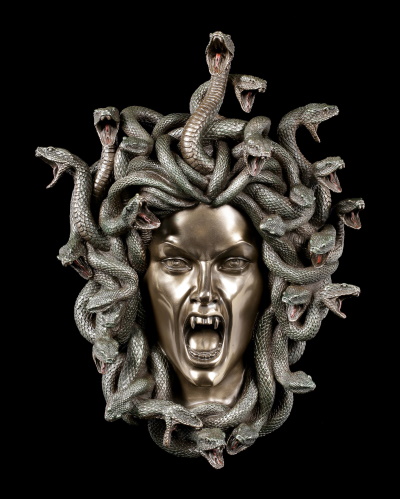No passer by will give a second glance
To the ancient woman making slow advance
Up hill; she ignores the crowd through whom she passes,
And with her Covid mask and large dark glasses,
Worn underneath a shapeless woollen hat,
You cannot see her face at all, and that
Is fine by her; she makes it very clear.
But now an unkempt man who smells of beer
Whines, ‘Got ’ny change?’ She mutters something grim
And ups her pace to get away from him.
But he persists, and reaches out to clutch
Her coat. She stiffens and it’s clear that such
An action is an impropriety
Unwelcome and unpleasing, and when he,
Oblivious to her manner, dares to ask
His ‘Got ’ny change?’ again, she rips her mask
Away, and glasses too, and with a stare
Transfixes him. She turns and leaves him there,
Crumbling to rubble. Passers-by, annoyed
And muttering, step sideways to avoid
What’s left of him, till one young woman, kind
And caring, bends to look at him and finds
A pile of broken stones. ‘What’s going on?’
She asks in vain. Medusa is long gone.
When your one talent’s turning folk to stone,
It’s little wonder if you live alone
And mostly friendless. For five thousand years
Medusa’s wandered through this vale of tears,
Her overtures of friendship being spurned
By those who hate the thought of being turned
To granite. I am sad to say that this
Would seem a universal prejudice.
She labours up the hill to Wetherspoons
And scowls on hearing tinny Christmas tunes
On the P.A., but is relieved to see,
Bent scowling at his double G and T,
Tiresias, blind and aged, yet all-seeing
And tired of three long thousand years of being
Foredoomed to know exactly what’s to come.
Medusa pushes fiercely through the scrum
Around the bar, but wisely does not try
Aggressively to catch the barman’s eye,
In case of side-effects. He knows her though,
And says ‘Your usual?’ and then ‘There you go.’
She takes her snakebite over to the table
Where blind Tiresias had of course been able
To foresee that she’d come, and, too, foresaw
She’d start to tell her grievances, all raw
And painful as they were, and she would moan
How there’s small fun in turning folks to stone
These days, and then she’d start berating
Perseus, as usual, for falsely stating
Such lies about their combat, and her head.
‘I ask, Tiresias, do I look dead?’
Tiresias does not like her very much,
But lets her sit with him, and, knowing such
As she have dreadful fates, this afternoon
He listens; being blind he is immune
Of course, to inadvertent petrifaction,
That thought gives him a certain satisfaction.
Now she’s descending into grim self-pity.
‘My knees are gone, and I’m no longer pretty.
I’m old and I’m a gorgon, Can you see
Just what, if anything’s in store for me?’
He chooses to be frank: ‘You’ll go from here
Leaving behind resentment, hate and fear,
As usual. And alas, I can foresee
No future pleasures. What will be will be.
You’ll live in Dewsbury, which you will not like,
Then Batley, sadly, and then Heckmondwike.’
Aghast at this grim reading of her fate,
The gorgon swigs her drink, disconsolate.
And then, distraught, tells the unseeing sage:
‘I’m getting near five thousand years of age
My feet are bad, my back is full of aches,
And look, I’ve now got dandruff in my snakes.’
Unthinking, she removes her woolly hat
Before Tiresias can tell her that
Is not a good idea. The snakes, all clustering thickly
Indeed do look more than a little sickly.
A lady at a neighbouring table gasps
To see a headpiece made of writhing asps.
Then others turn and stare, and make remarks,
Surrounding her like fierce and hostile sharks,
Till in a panic state, instinctively
She whips off mask and specs, so all can see
The fury of her petrifying face.
Twenty new statues now stand in that place.
The bartender calls out: ‘Oi you! You’re barred.’
She stumbles to the doorway. Life is hard.

